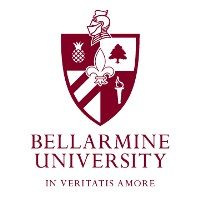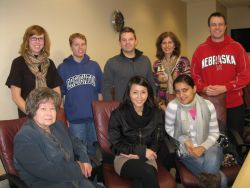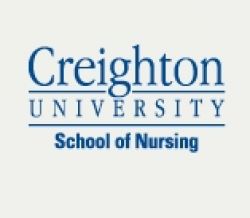Making a Difference in Diversity: Successful Minority Recruiting Efforts in Nebraska, Kentucky and West Virginia
Increasing diversity is a top priority of the New Careers in Nursing (NCIN) program. We believe a diverse nursing workforce is better able to provide culturally competent care. Many of our grantees have had tremendous success recruiting students from groups that are underrepresented in nursing, and they use a variety of techniques to recruit these scholars. Whether it is using the latest social media platform or joining a centralized application system, grantees are discovering new methods that will better allow diverse scholars from all over the country to enroll at their accelerated schools of nursing.
Creighton University, located in Omaha, Nebraska is a first time grantee. Many of the nursing students at Creighton come from states with few, or highly competitive, nursing programs, says Amy Cosimano, EdD, RN, assistant dean of student affairs in the School of Nursing. To address that fact, Creighton built a strong online presence to recruit students.
“Believe it or not, we do most of our out-of-state recruiting through Facebook. We also receive many inquiries from prospective students finding our website through Internet search engines.”
 NCIN scholar Waheeda Siddiqui learned about Creighton’s School of Nursing online and ultimately decided to enroll. After completing her undergraduate degree at Arizona State University, Siddiqui decided she wanted to become a nurse. After extensive online research, Siddiqui knew that if she wanted to complete a nursing degree in under a year, then she would have to leave Arizona and move to a state where accelerated nursing programs were plentiful. After researching her options, she learned that Creighton University had high NCLEX pass rates (exam required to practice nursing in all states) and very favorable online reviews.
NCIN scholar Waheeda Siddiqui learned about Creighton’s School of Nursing online and ultimately decided to enroll. After completing her undergraduate degree at Arizona State University, Siddiqui decided she wanted to become a nurse. After extensive online research, Siddiqui knew that if she wanted to complete a nursing degree in under a year, then she would have to leave Arizona and move to a state where accelerated nursing programs were plentiful. After researching her options, she learned that Creighton University had high NCLEX pass rates (exam required to practice nursing in all states) and very favorable online reviews.
“It was the only school I applied to attend,” Siddiqui says. But without the NCIN scholarship, she would not have been able to afford it. Learning about financial aid options and scholarships is important for getting underrepresented students into nursing school, she says.
“School—especially out of state—is expensive. If underrepresented students know about the loans and scholarships they quality for, it helps get their foot in the door.”
For Siddiqui, who grew up in Afghanistan and Pakistan before coming to the United States in high school, going to school for an advanced nursing degree is a new and exciting opportunity. In the Middle East, a bachelor’s degree or university education is not required before completing the training to be a nurse, she explains. The career is not viewed with as much respect there as it is in the United States. But she knows her degree will have value.
“My mom was a nurse and loved what she did, so I knew that’s what I wanted to do. Having a higher level of education will open new possibilities for me, and I’ll be more knowledgeable and be able to advocate for myself as a nursing professional.”
This year, Creighton granted eight NCIN scholarships to students from underrepresented groups in nursing; five went to minority women, and three to male students.
 At Bellarmine University in Louisville, Kentucky, recruiting has been made easier through Nursing Centralized Application System (NursingCAS), which allows students to apply to multiple schools of nursing with one application. The system was launched in 2010 by the American Association of Colleges of Nursing (AACN) to provide nursing students at all educational levels a more convenient and efficient application process, eliminating the need to duplicate information or submit multiple transcripts and letters of recommendation.
At Bellarmine University in Louisville, Kentucky, recruiting has been made easier through Nursing Centralized Application System (NursingCAS), which allows students to apply to multiple schools of nursing with one application. The system was launched in 2010 by the American Association of Colleges of Nursing (AACN) to provide nursing students at all educational levels a more convenient and efficient application process, eliminating the need to duplicate information or submit multiple transcripts and letters of recommendation.
NursingCAS also has advantages for participating schools. Admissions officers can send automated messages to students who have applied and even to those who have started, but not completed, their applications. And because of the system’s simplicity and streamlined process, it’s easier for students from out of state to find—and subsequently apply to—Bellarmine.
“NursingCAS has been a great tool for us because we’re getting so many more people from out of state,” explains Julie Armstrong-Binnix, MEd, graduate admissions officer and Bellarmine’s main recruiter for the accelerated BSN program. “We have the ability to contact people faster and have a bigger reach.”
Bellarmine also recruits heavily within the university itself and the local community. In addition to events focused on second career nurses, Bellarmine holds biannual recruiting events with other health care programs at the university, specifically targeted at students who are interested in changing careers.
NCIN scholar Adam Pike attended one of the local recruitment events. While Pike’s wife was a graduate student at Bellarmine, he had never considered it among his options when he decided to go to the nursing school. He heard about the accelerated degree program through word-of-mouth and sought out more information on the school’s website.
Pike then attended a “Navigating Nursing” night at the school, and things fell into place. It was at that event that he learned about the NCIN scholarship. After talking to Armstrong-Binnix, he says, “all of a sudden it was a go and I realized we could make this work.”
“The scholarship made the difference for me,” Pike says. “We struggle enough just to pay the balances remaining beyond what student loans cover, and had that scholarship not been there I would have had to consider other options.”
Bellarmine’s recruiting efforts, in combination with NCIN scholarships, have increased the underrepresented and economically disadvantaged student population by 50 percent. Of the nearly 100 students beginning the program this spring, 26 are from groups underrepresented in nursing.

While other schools may focus on recruiting underrepresented groups from around the country, West Virginia University (WVU), in Morgantown, doesn’t have to look far beyond its own front door. In a state rife with economically disadvantaged residents, recruiters have found a unique set of challenges.
Many in the state don’t have baccalaureate degrees, explains Elisabeth Shelton, PhD, RN, associate dean of nursing, meaning they aren’t eligible for the accelerated degree program or an NCIN scholarship. WVU often encourages non-traditional students to first pursue a Regent’s degree, which offers college-equivalent credit for life and work experience, which is used toward the completion of the undergraduate degree.
“We have been able to recruit some excellent students through that approach who have a wealth of experiences and the maturity that is needed to make them a wonderful asset to the program and to the nursing profession,” Shelton says.
Even those who have a previous degree may still face hardships; many have used all of the student loans available to them or must work full time to meet living expenses. The NCIN scholarships have helped tremendously in that regard, Shelton says, and the program works with students on an individual basis to alter their progression if they need to work while in school.
Shelton says students and faculty are the school’s best recruiting tool. Nursing students talk to high school students about nursing careers and also serve as unofficial ambassadors when they complete service-learning projects throughout the state. “Some of our own faculty are from very impoverished areas of Appalachia and do projects in their home communities that serve as recruitment activities,” she says. “We really try to show nursing in action and use students and faculty as our recruitment ambassadors.”
Of course, the NCIN scholarships are themselves an effective recruitment strategy. Cosimano says interest in the Creighton accelerated degree program increased after the university received the NCIN grant. “It was very well publicized in our area and many prospective students questioned if they would qualify for the scholarship,” she explains. “It greatly reduces their tuition, which then makes our program a realistic option.”
Cosimano hopes that sharing how the funding has helped Creighton’s first cohort will help with recruitment in the future. “These students will graduate in August and it will be exciting to see how this opportunity has influenced their future as professional nurses and potential nurse leaders.”

